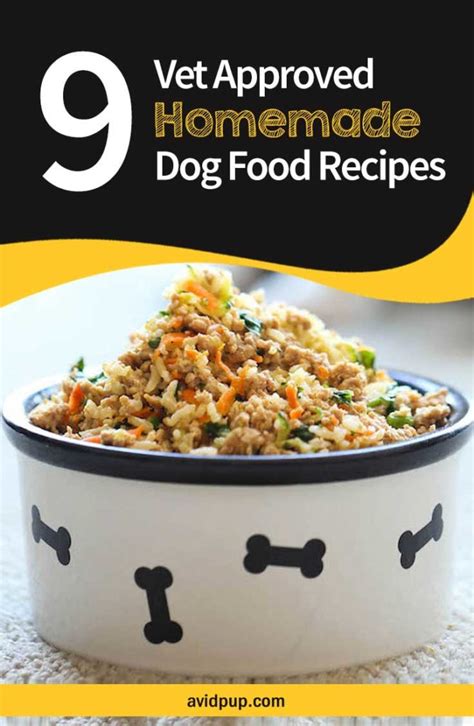Vet-Approved Homemade Dog Food Recipes: A Guide to Nutritional Canine Cuisine
Are you considering making your own dog food? Homemade dog food offers the potential for greater control over ingredients and a deeper understanding of what your furry friend is consuming. However, it's crucial to ensure your recipes are nutritionally balanced to avoid deficiencies. This guide provides vet-approved principles and sample recipes to help you craft a healthy and delicious homemade diet for your canine companion. Remember to always consult your veterinarian before making any significant changes to your dog's diet, especially if they have pre-existing health conditions.
Why Choose Homemade Dog Food?
Many pet owners choose homemade dog food for several reasons:
- Ingredient Control: You know exactly what goes into your dog's food, avoiding potentially harmful additives, fillers, and artificial ingredients found in commercial brands.
- Dietary Needs: Homemade food allows for easy customization to address specific dietary requirements, allergies, or sensitivities.
- Improved Digestion: Some dogs experience better digestion with homemade food due to the use of fresh, whole ingredients.
- Bonding Experience: Preparing your dog's food can be a rewarding and bonding experience.
Essential Nutritional Components for Canine Health
Before diving into recipes, understanding the key nutritional components is vital. A balanced homemade dog food should include:
- Protein: The cornerstone of a dog's diet, providing essential amino acids for muscle building and overall health. Good sources include lean meats (chicken, turkey, beef), fish (salmon, tuna), and eggs.
- Fat: Provides energy, supports skin and coat health, and aids in nutrient absorption. Healthy fats come from sources like fish oil, coconut oil, and chicken fat.
- Carbohydrates: A source of energy, but should be chosen carefully. Opt for complex carbohydrates like sweet potatoes, brown rice, and oats, avoiding excessive simple sugars.
- Fruits and Vegetables: Provide essential vitamins, minerals, and antioxidants. Include a variety of colorful options like carrots, green beans, broccoli, blueberries, and apples (remove seeds and core).
- Calcium and Phosphorus: Essential for bone health. You can incorporate these through bone broth, sardines (bones included), and yogurt.
Vet-Approved Homemade Dog Food Recipes (Consult your vet before implementing!)
These recipes are examples and may need adjustments based on your dog's size, age, activity level, and breed. Always consult with your veterinarian to ensure the recipes meet your dog's specific nutritional requirements.
Recipe 1: Simple Chicken and Rice
-
Ingredients:
- 1 lb boneless, skinless chicken breast, cooked and shredded
- 1 cup brown rice, cooked
- 1/2 cup chopped carrots
- 1/4 cup chopped green beans
- 1 tbsp olive oil
- 1 egg (lightly scrambled)
-
Instructions: Combine all ingredients thoroughly and serve.
Recipe 2: Salmon and Sweet Potato Delight
-
Ingredients:
- 1 lb canned salmon (packed in water, bones removed)
- 1 cup cooked sweet potato, mashed
- 1/2 cup cooked peas
- 1/4 cup plain yogurt
- 1 tbsp flaxseed oil
-
Instructions: Mix all ingredients until well combined.
Important Considerations for Homemade Dog Food
- Portion Control: Calculate the appropriate amount based on your dog's weight, breed, and activity level. Your veterinarian can provide guidance.
- Food Safety: Always handle and store food safely to prevent bacterial contamination.
- Gradual Transition: Introduce homemade food gradually to avoid digestive upset.
- Supplements: Your vet may recommend supplements to ensure complete nutritional coverage.
- Regular Vet Checkups: Monitor your dog's weight, coat condition, and energy levels. Regular vet checkups are crucial to ensure the homemade diet is meeting their nutritional needs.
Making your own dog food can be a rewarding experience, but it's crucial to approach it with knowledge and careful planning. By following these guidelines and consulting your veterinarian, you can provide your canine companion with a healthy and nutritious homemade diet. Remember, this information is for guidance only; always consult your vet before making significant dietary changes for your pet.
